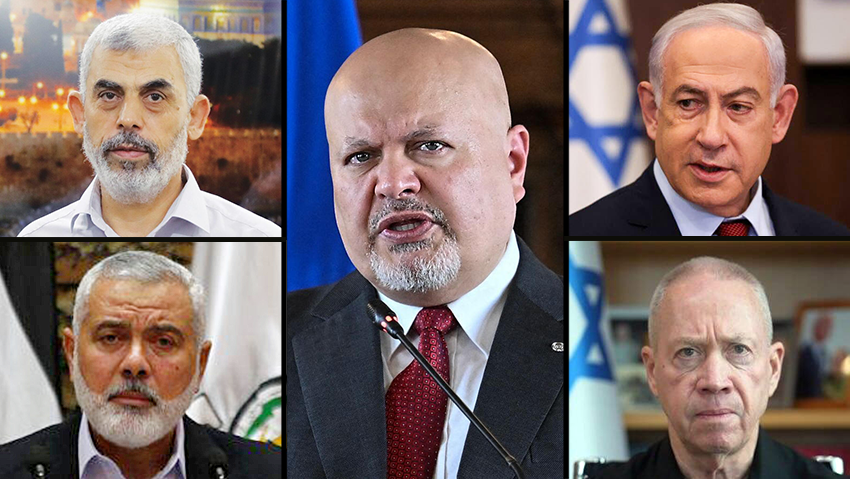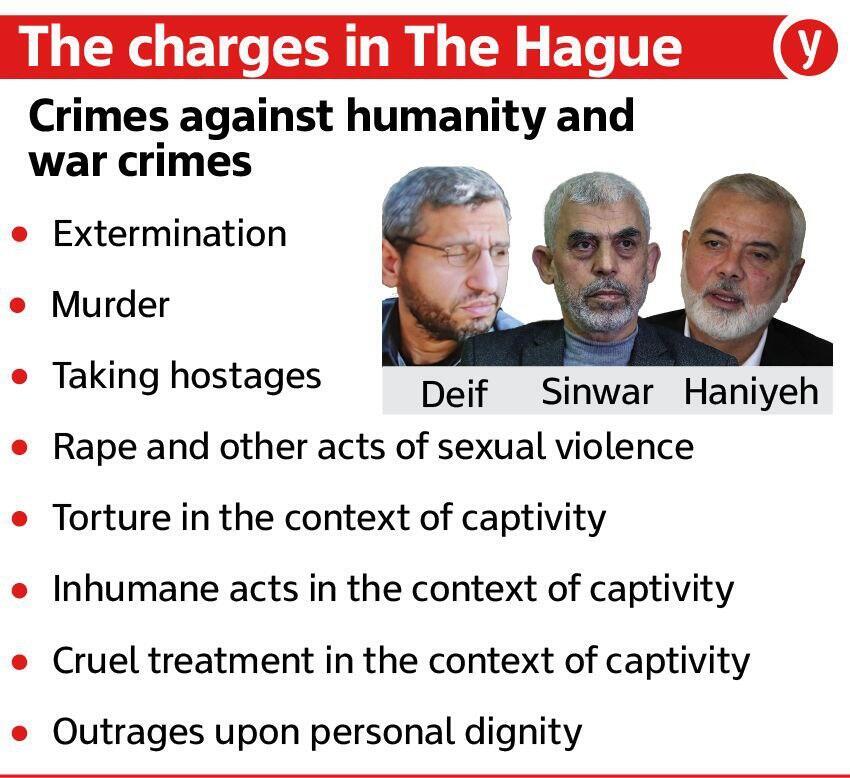Karim Khan, the prosecutor general of the International Criminal Court (ICC) in The Hague, announced on Monday that he has requested international arrest warrants for Israeli Prime Minister Benjamin Netanyahu and Defense Minister Yoav Gallant, as well as Hamas leader in Gaza Yahya Sinwar, Hamas Political Bureau Chief Ismail Haniyeh, and Hamas Military Wing Chief Mohammed Deif on charges of war crimes.
3 View gallery


Both Israel and Hamas are on the hook
(Photo: Yonathan Zindel, Luis ACOSTA / AFP, אלעד מלכה)
Once the ICC prosecutor general submitted the significant request for arrest warrants against Netanyahu, Gallant, and senior Hamas officials, the matter was transferred to the pre-trial chamber responsible for cases related to the Palestinians. The procedure requires the court to review the prosecutor's requests and may involve requesting additional evidence. In Israel, it is anticipated that the pre-trial chamber will approve Khan's request and issue the arrest warrants.
Even if arrest warrants are issued against Netanyahu and Gallant, it does not mean they will be immediately detained – this would only occur if they travel to one of the 123 countries (excluding the Palestinian Authority) that are signatories to the Rome Statute. For example, the United States is not a signatory, but many Western countries are.
Russian President Vladimir Putin has not been arrested despite an outstanding warrant for over a year because he has not visited any of the countries that have signed the Rome Statute. However, the impact on Israel's international standing would be significant, especially at a time when the government is already facing global criticism over its conduct in the Gaza conflict, which has resulted in delays in arms shipments from the United States.
The panel reviewing Khan's request is made up of three judges: Judge Iulia Motoc from Romania, who has been serving in The Hague since March and was appointed for a 10-year term; Judge Reine Alapini-Gansou from Benin, who joined the court in March 2018 for a nine-year term; and Judge Socorro Flores Liera from Mexico, who was appointed in March 2021 for a nine-year term.
Professor Amichai Cohen, a senior fellow at the Israel Democracy Institute, says that there are several more steps in the process. "For the prosecutor to issue the arrest warrants as requested, he needs the approval of a panel of three judges (pre-trial chamber), who will assess whether there are reasonable grounds to believe the crimes were committed and whether the arrest warrant is necessary for the judicial process. The suspects do not have the right to representation in the judicial approval process which, based on past experience, may take from several days to a few weeks."
According to Cohen: "The Rome Statute does not provide an option to appeal an issued arrest warrant. Since there is no statute of limitations on crimes under the statute, arrest warrants issued by the court may remain in force for many years, even after the suspect no longer holds the position they held at the time the crimes were committed. The pre-trial chamber is authorized to cancel arrest warrants, but so far this authority has only been exercised after the death of suspects."
(Statement by Karim Khan)
In his statement on Monday, the prosecutor explained why he issued the warrants. "On the basis of evidence collected and examined by my Office, I have reasonable grounds to believe that Benjamin Netanyahu, the prime minister of Israel, and Yoav Gallant, the minister of defense of Israel, bear criminal responsibility for the following war crimes and crimes against humanity committed on the territory of the State of Palestine (in the Gaza Strip) from at least 8 October 2023:
- Starvation of civilians as a method of warfare as a war crime contrary to article 8(2)(b)(xxv) of the Statute;
- Wilfully causing great suffering, or serious injury to body or health contrary to article 8(2)(a)(iii), or cruel treatment as a war crime contrary to article 8(2)(c)(i);
- Wilful killing contrary to article 8(2)(a)(i), or Murder as a war crime contrary to article 8(2)(c)(i);
- Intentionally directing attacks against a civilian population as a war crime contrary to articles 8(2)(b)(i), or 8(2)(e)(i);
- Extermination and/or murder contrary to articles 7(1)(b) and 7(1)(a), including in the context of deaths caused by starvation, as a crime against humanity;
- Persecution as a crime against humanity contrary to article 7(1)(h);
- Other inhumane acts as crimes against humanity contrary to article 7(1)(k).
"My office submits that the war crimes alleged in these applications were committed in the context of an international armed conflict between Israel and Palestine, and a non-international armed conflict between Israel and Hamas (together with other Palestinian Armed Groups) running in parallel. We submit that the crimes against humanity charged were committed as part of a widespread and systematic attack against the Palestinian civilian population pursuant to State policy. These crimes, in our assessment, continue to this day."
Khan added regarding the charges against the senior Israeli officials: "The siege also included cutting off cross-border water pipelines from Israel to Gaza – Gazans’ principal source of clean water – for a prolonged period beginning 9 October 2023, and cutting off and hindering electricity supplies from at least 8 October 2023 until today. This took place alongside other attacks on civilians, including those lining up for food; obstruction of aid delivery by humanitarian agencies; and attacks on and killing of aid workers, which forced many agencies to cease or limit their operations in Gaza.
"My oOffice submits that these acts were committed as part of a common plan to use starvation as a method of war and other acts of violence against the Gazan civilian population as a means to (i) eliminate Hamas; (ii) secure the return of the hostages which Hamas has abducted, and (iii) collectively punish the civilian population of Gaza, whom they perceived as a threat to Israel.
"The effects of the use of starvation as a method of warfare, together with other attacks and collective punishment against the civilian population of Gaza are acute, visible and widely known, and have been confirmed by multiple witnesses interviewed by my office, including local and international medical doctors. They include malnutrition, dehydration, profound suffering and an increasing number of deaths among the Palestinian population, including babies, other children, and women."
3 View gallery


Aid trucks on route to Gaza
(Photo: Coordinator of Government Activities in the Territories)
In Israel, officials have repeatedly claimed in recent months that there is nothing preventing humanitarian aid from entering the Gaza Strip and accuse the UN of being unable to distribute it. The UN rejects these claims and places the responsibility on Israel. Recently, the Rafah crossing, through which significant aid flowed into the Strip, was closed, with Egypt blaming Israel's control over the crossing. Conversely, the temporary pier established by the United States in the Mediterranean Sea began operating and delivering humanitarian aid to the Strip by sea.
In Israel there is strong opposition to the claim that the ICC has jurisdiction over the matter. This is because Israel is not a signatory the Rome Statute. However, the court itself claims it has jurisdiction over Gaza, East Jerusalem and the West Bank after Palestinian leaders agreed in 2015 to be bound by its foundational principles.


